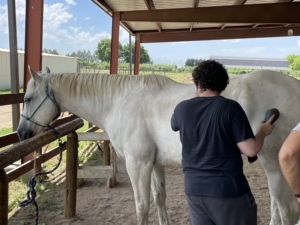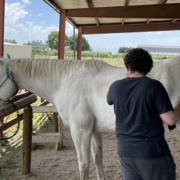The Benefits of Using Equine Therapy in Mental Health Treatment
 Animals can provide great emotional support for human beings. Beyond the loving pet-owner relationship that many of us have experienced, animals are also used in therapeutic settings to help clients navigate challenging emotional experiences.
Animals can provide great emotional support for human beings. Beyond the loving pet-owner relationship that many of us have experienced, animals are also used in therapeutic settings to help clients navigate challenging emotional experiences.
As the name indicates equine-assisted therapy incorporates horses into the therapeutic process. “People engage in activities such as grooming, feeding, and leading a horse while being supervised by a mental health professional,” explained Jodi Clarke, MA, LPC/MHSP on Verywell Mind in January. “Goals of this form of therapy [include] helping people develop skills such as emotional regulation, self-confidence, and responsibility. With mature horses weighing anywhere in the range of 900 to 2,000 pounds or more, it might feel a bit intimidating to have such a large, majestic creature participating in your therapy sessions. However, equine-assisted therapy is growing in popularity due to its experiential approach and some burgeoning evidence of its effectiveness.”
Bernadette Robinson, MA, is Colorado Recovery’s transitional and independent living coordinator. She supervises equine therapy sessions for our clients at the Colorado Therapeutic Riding Center (CTRC) in Longmont, CO. Colorado Recovery teamed up with CTRC in 2022 to be able to offer this service to clients. The Colorado Therapeutic Riding Center is the oldest therapeutic riding center in the Centennial State and has been operating since 1980.
“Each client creates a special bond with their assigned horse,” says Robinson, “gaining trust, learning boundaries, nourishing a connection.” Working with horses “provides a sense of accomplishment as each client grows more comfortable and confident around the animals.”
On its 39-acre campus, CTRC offers therapeutic horsemanship, equine-assisted therapies, and equine-assisted mental health services. “The horses are really the modality of treatment,” says CTRC’s executive director Michele Bruhn. “Clients are not necessarily learning how to ride a horse as our therapists work on different goals for each individual client. We evaluate our clients’ affect and body structure and then match the right type of horse with that person.” All CTRC instructors are certified through Path International.
“Some of the activities, such as guiding their horse around various obstacles, can represent a powerful metaphor for overcoming their own personal obstacles in their individual recovery process,” explains Robinson. “Overcoming fear was a big obstacle for me, personally. I’m historically terrified of horses. I had to face my own fear and move through it in order to be at CTRC with our clients.”
For clients who don’t like to share a lot about themselves and their personal lives, equine therapy may provide an outlet to be vulnerable. “It’s a safe place to be vulnerable,” says Robinson.
Engaging activities such as working with horses are all part of the groundbreaking approach to mental health treatment pioneered by the late Colorado Recovery founder Richard Warner. Recovery from serious mental illness requires that patients retain a sense of empowerment—a belief in their ability to take charge of their lives and manage the complex challenges of their illness.
At Colorado Recovery it is our mission to help adults with serious mental health issues stabilize their illness, minimize symptoms, improve functioning, and enhance each person’s social inclusion, quality of life, and sense of meaning in life.
If you have questions about our recovery model or our services to treat schizophrenia, bipolar disorder, and similar mental illnesses, call us at 720-218-4068 to discuss treatment options for you or the person you would like to help.





